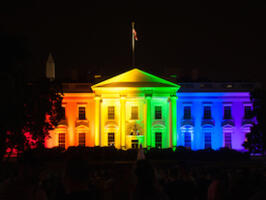Same-Sex Marriage Moving Toward the Mainstream
A Commentary By Michael Barone
One of the few issues on which opinion has moved left over the last few years is same-sex marriage. In 1996, Gallup found that Americans opposed it by a 68 percent to 27 percent margin. Last May, Gallup found Americans in favor by 53 percent to 45 percent. That's a huge change in 15 years.
Other polls have shown similar movement. Pew Research reported last week that 45 percent favored same-sex marriage and 46 percent were opposed -- a dead heat. Pew polls in 2008 and 2009 found only 35 percent to 40 percent in favor.
This is an issue on which the differences between age groups are as large as any I can remember. In the May Gallup poll, 70 percent of those under age 35 favored same-sex marriage. Only 39 percent of those over 55 agreed.
So while opinion on one controversial cultural issue, abortion, has not changed much, opinion on same-sex marriage has changed vastly.
Why? One reason is probably that as people learn that friends and relatives are gay, they become more sympathetic to gay rights. We see a similar change in voters' willingness to elect openly gay candidates to Congress and other offices.
But increasing support for same-sex marriage causes problems for politicians. When two-thirds of voters were opposed, it didn't: Almost everyone opposed it. Possible exception: Barack Obama, running for state Senate in a university-dominated district in 1996.
As a candidate for U.S. senator and president, Obama said he opposed same-sex marriage. As president, he says he still does, but his opinion is "evolving."
This may reflect a split between Democratic core constituencies. Affluent liberals overwhelmingly favor same-sex marriage. But most black voters are opposed.
In a 2008 referendum in California, 70 percent of blacks voted against same-sex marriage. A same-sex marriage bill was defeated this year in Maryland after black Democratic legislators opposed it. Same-sex marriage would be legal in California and Maryland were it not for opposition by black voters.
Mainstream media reporters pepper Republican presidential candidates with questions about the issue but seldom ask Obama about it. But if it's a fair question for Republicans, it's a fair question for Democrats, as well.
The problem for Republican politicians is not that opposition to same-sex marriage antagonizes gay voters. According to exit polls in the last three presidential elections, gays and lesbians made up just 3 percent of the electorate, and they were one of the few groups that voted for John McCain in 2008 in larger numbers than had voted for George W. Bush in 2004.
The Republicans' problem is young voters. Huge majorities of them favor same-sex marriage, and for most of them it's simply a no-brainer. They must have been turned off if they were watching the Republican presidential candidates vie with each other in opposing it in the Fox News-Washington Examiner debate in Iowa.
The constitutional amendment banning same-sex marriage that they supported is never going to get a two-thirds vote in Congress or be ratified by three-quarters of state legislatures. Unless the Supreme Court rules there is a constitutional right to same-sex marriage, this is an issue that is going to be decided by the states.
Opponents of same-sex marriage argue that it would weaken the institution of the family. Certainly there are problems there: Rising percentages of children are raised by one parent or none, and nearly 50 percent of teenage children in non-college households did not live with both parents. Yet outcomes for children raised in two-parent families are far better than for those who are not.
But as one who favors same-sex marriage for reasons set out in Jonathan Rauch's 2004 book "Gay Marriage," I think the institution of the family is less threatened by a few people who want to get married than by the very many more people who get divorced or who have children without getting married at all.
In any case, we now have an experiment going on. Some 11 percent of Americans live in the six states and the District of Columbia that allow same-sex marriage. That would rise to 23 percent if California voters, who narrowly rejected it, switch. Other states may follow. On the other hand, states where blacks and white evangelical Protestants form a majority are unlikely to accept it any time soon.
We will be able to see how things work out and make judgments, without much need for guidance from our presidents or presidential candidates.
Michael Barone, senior political analyst for The Washington Examiner (www.washingtonexaminer.com), is a resident fellow at the American Enterprise Institute, a Fox News Channel contributor and a co-author of The Almanac of American Politics.
COPYRIGHT 2011 THE WASHINGTON EXAMINER
DISTRIBUTED BY CREATORS.COM
See Other Political Commentaries.
See Other Commentaries by Michael Barone.
Views expressed in this column are those of the author, not those of Rasmussen Reports. Comments about this content should be directed to the author or syndicate.
Rasmussen Reports is a media company specializing in the collection, publication and distribution of public opinion information.
We conduct public opinion polls on a variety of topics to inform our audience on events in the news and other topics of interest. To ensure editorial control and independence, we pay for the polls ourselves and generate revenue through the sale of subscriptions, sponsorships, and advertising. Nightly polling on politics, business and lifestyle topics provides the content to update the Rasmussen Reports web site many times each day. If it's in the news, it's in our polls. Additionally, the data drives a daily update newsletter and various media outlets across the country.
Some information, including the Rasmussen Reports daily Presidential Tracking Poll and commentaries are available for free to the general public. Subscriptions are available for $4.95 a month or 34.95 a year that provide subscribers with exclusive access to more than 20 stories per week on upcoming elections, consumer confidence, and issues that affect us all. For those who are really into the numbers, Platinum Members can review demographic crosstabs and a full history of our data.
To learn more about our methodology, click here.


